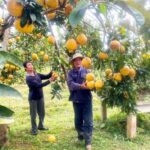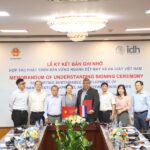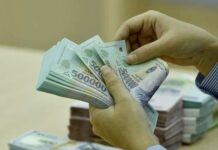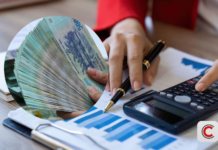According to calculations by the General Statistics Office, for every dong disbursed in public investment, 1.62 dongs of non-state investment capital are attracted into the economy. At the same time, a 10% increase in public investment disbursement compared to the previous year will boost GDP by an additional 0.6 percentage points. Not to mention, a one-percentage point increase in investment efficiency will spur GDP growth by about 0.1-0.12 percentage points. This is why the government continues to view public investment disbursement as an important driver to accelerate economic recovery and social development, ensuring the GDP growth target of an estimated 6.8-7% for the whole of 2024.
Mr. Bui Huy Son, Director of the Planning and Finance Department (Ministry of Industry and Trade), said that thanks to the disbursement of public investment capital, it has helped consume the products of many industries in Vietnam, such as iron and steel, cement, and construction materials. . Thanks to that, it contributes to the growth of industrial sectors. Accelerating and promoting the strong disbursement of public investment capital will continue to be a channel to stimulate the consumption of domestic industrial and construction products.
“We see large infrastructure investment projects, including transportation and energy, and many other projects. It’s not just about roads or power lines, but it will directly support production and thereby support market development. So public investment is associated with those two drivers. The efforts to implement support solutions, fiscal and monetary policies issued by the Government are very determined and timely. Obviously, overall, it has been very helpful for production and business” – Mr. Son expressed.
Promoting consumer demand requires both solutions to support businesses and the domestic market. In the remaining months of the year, the industry and trade sector will focus on solutions to exploit the domestic market, stimulate consumption, tourism, and develop e-commerce… to make shopping and consumption more convenient.
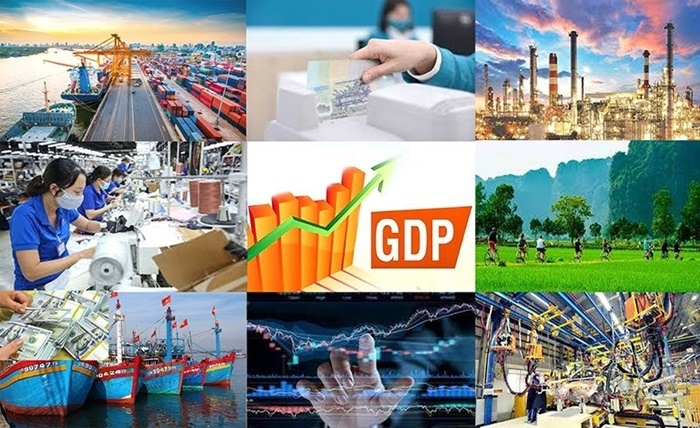
Illustration: KT
Mr. Bui Huy Son added: “In the domestic market, we will continue to strongly develop domestic trade, exploit it effectively, especially in the last months of the year with many festivals and close to the preparation for the Lunar New Year. At the same time, promote the development of e-commerce to effectively exploit the economic development channel digital, implement the Law on Competition, the Law on Consumer Protection, strengthen inspection and control to ensure the healthy development of the domestic market”.
A report by the General Statistics Office shows that the total retail sales of goods and service revenue for the first ten months of 2024 is estimated at more than 5 million and 246 billion VND, up 8.5% compared to the same period last year (in the same period in 2023 increased by 9.8%). , if excluding the price factor, it increased by 4.6% (in the same period in 2023 increased by 7.3%). This is still a low increase, and more solutions are needed to support the market.
According to Dr. Nguyen Quoc Viet – Deputy Director of the Institute of Economic Policy Research (VEPR) – Vietnam National University, Hanoi: “The recovery of the domestic market is also a factor contributing to the growth momentum of the Vietnamese economy. However, we see that this growth momentum is not really sustainable, and it is not growing strongly as expected. compared to the pre-COVID-19 period.
We see that, if we exclude inflation, domestic consumption growth is only about 5% (half that of the pre-COVID-19 period). Therefore, to overcome the instability of global consumer demand as well as the instability of the world economy, we must really pay attention to promoting the sustainable development and growth of the domestic market. This includes areas such as tourism, shopping, etc. Then, how to activate to enhance people’s spending capacity, especially to ensure people’s income, how to make people feel more secure in accumulating as well as consuming in the future.
Therefore, reforming tax policies, especially personal income tax policies in the coming time, I think, is also a highlight, so that Vietnam can strive to have a middle class and thereby contribute to the growth momentum of services and domestic consumption in the future. better, ensuring growth. In terms of growth drivers, we need to balance the two drivers of foreign economic relations and domestic economy in the future”.
Regarding fiscal policies to support the market, especially tax tools, according to many experts, it is necessary to consider both short and long term. The proposal to reduce environmental taxes on gasoline and oil until the end of 2025 is one option, but in the context of green transformation and encouraging efficient consumption, it needs to be considered. carefully. The study to amend the Law on Special Consumption Tax with a plan to strongly increase taxes on alcoholic beverages and sugary drinks for the purpose of protecting consumers’ health also needs to be carefully calculated, because if not, it will strongly affect the registered production and business enterprises of this industry, and develop products of unknown origin and quality. difficult to control.
Mr. Bui Ngoc Tuan – Deputy General Director of Deloitte Vietnam Tax Consulting Company said: “We assess that the roadmap for increasing tax rates for beer and alcohol products in the coming time will certainly create a very heavy burden on domestic producers. Adjustments to the Law on Special Consumption Tax may affect social consumption trends. For example, instead of reducing the consumption of officially-declared beer and alcohol, people may use products of unknown origin or produce them illegally, or turn to traditional liquors that are difficult to control by the market management agency.
Therefore, from a negative perspective, it may create negative consequences in society, not promoting the development of officially-declared products, and businesses that are already producing and trading in the market and paying taxes fully”.
According to many experts, to stimulate domestic consumption, Vietnam should refer to some policies from neighboring countries, such as Thailand’s policy of applying a visa exemption from the beginning of May 2024 for another 6 months, and then the plan to finance 122 billion baht for the country’s “digital wallet” program; Or the local governments of China are quickly implementing the issuance of bonds to pour capital into infrastructure projects, for example.
The Dark Side of ESG
“Dynamic Equilibrium” coupled with “Dynamic Capabilities” enables organizations to establish a sustainable competitive advantage by calibrating their resources and capabilities in response to the ever-changing business landscape. This approach allows businesses to be agile and responsive, ensuring they remain resilient and ahead of the curve in a volatile market environment.
The New Land Price List Adjustment’s Impact on Ho Chi Minh City
The recent land price adjustments in Ho Chi Minh City are a significant move, reflecting the city’s development and the need to adapt to the changing reality. Despite short-term challenges, the new land price list brings about a host of positive impacts. It lays the foundation for a sustainable real estate market, promoting transparency, fairness, and the city’s comprehensive development while addressing the current situation.
“Sustainable Agriculture in Thanh Hoa: Embracing Green Practices for a Prosperous Future”
Organic farming practices are gaining traction among households and cooperatives in Thanh Hoa province. By embracing eco-friendly and sustainable agricultural methods, they are producing goods that are not only safe for consumers but also environmentally conscious. This approach is pivotal to fostering long-term growth in the agricultural economy, minimizing environmental footprints, and promoting the well-being of the community.
“Empowering the Sustainable Evolution of the Textile and Footwear Industries”
The Memorandum of Understanding between the Ministry of Industry and Trade and IDH on supporting the sustainable development of Vietnam’s textile and footwear industries will enhance the competitiveness of domestic textile and footwear enterprises. It will also contribute to Vietnam’s international commitments on sustainable development and climate change in the coming years.
Sustainable Investing: A Global Trend, Not a Passing Fad
“Sustainable investing has become a hot topic as it ushers in a new era of environmental consciousness and a ‘new playing field’ for businesses and investors alike. This was emphasized by journalist Kim Hanh, who shed light on the importance of this paradigm shift and how it is changing the landscape of the business world.”




























